2023届高考英语二轮复习: 形容词和副词课件 (共47张PPT)
文档属性
| 名称 | 2023届高考英语二轮复习: 形容词和副词课件 (共47张PPT) | 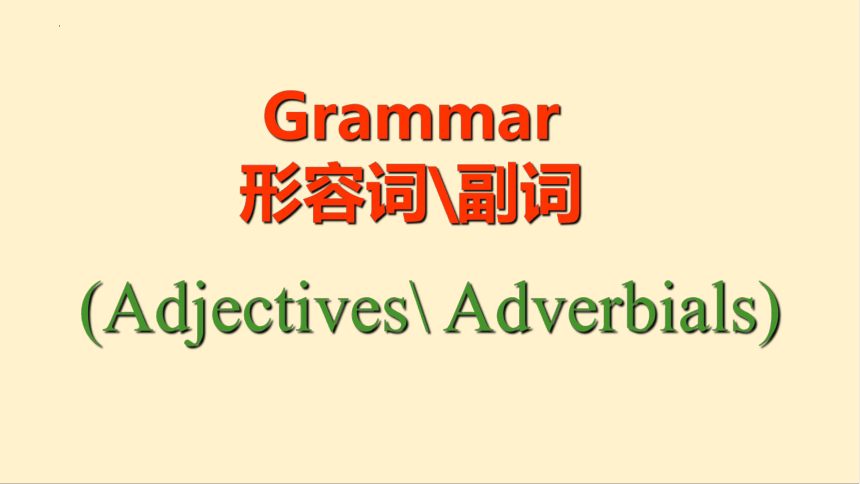 | |
| 格式 | pptx | ||
| 文件大小 | 511.9KB | ||
| 资源类型 | 教案 | ||
| 版本资源 | 通用版 | ||
| 科目 | 英语 | ||
| 更新时间 | 2023-03-13 19:43:21 | ||
图片预览

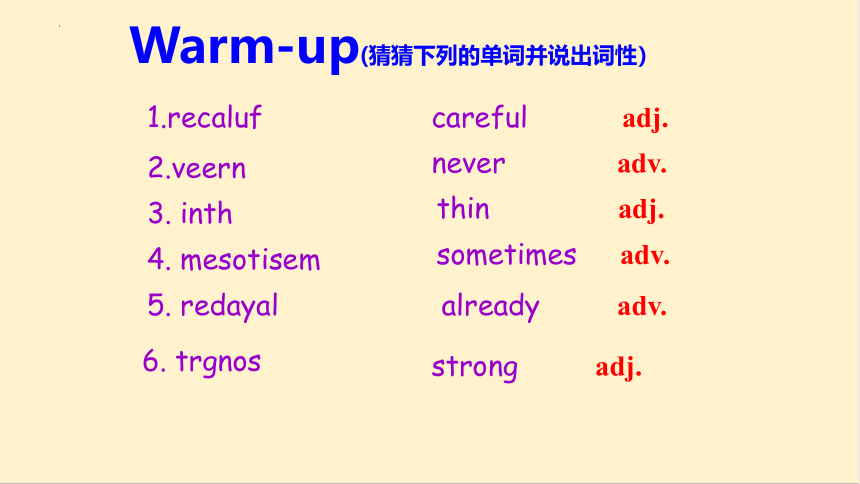
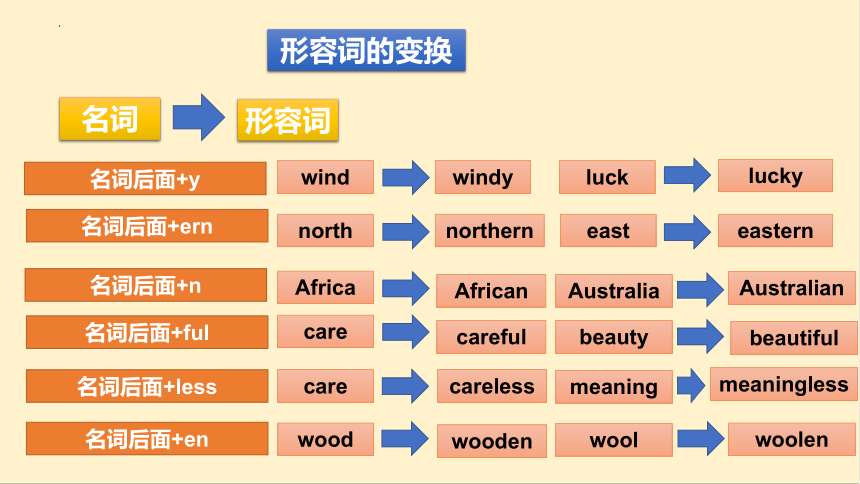
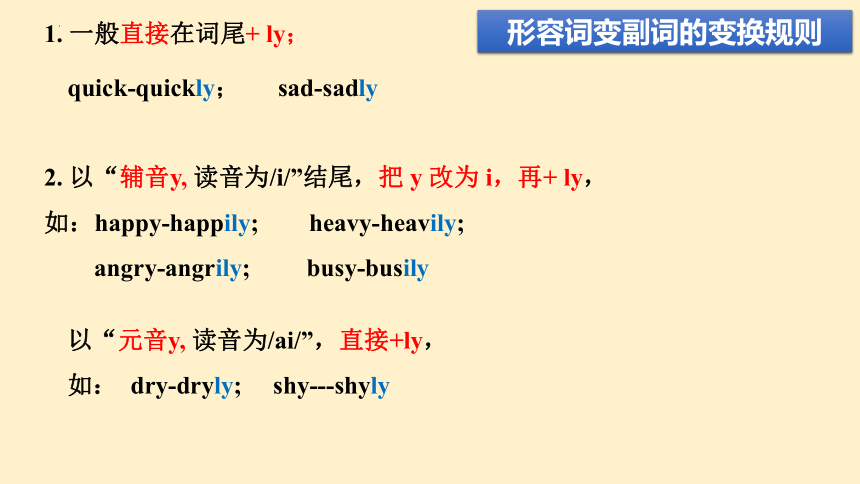
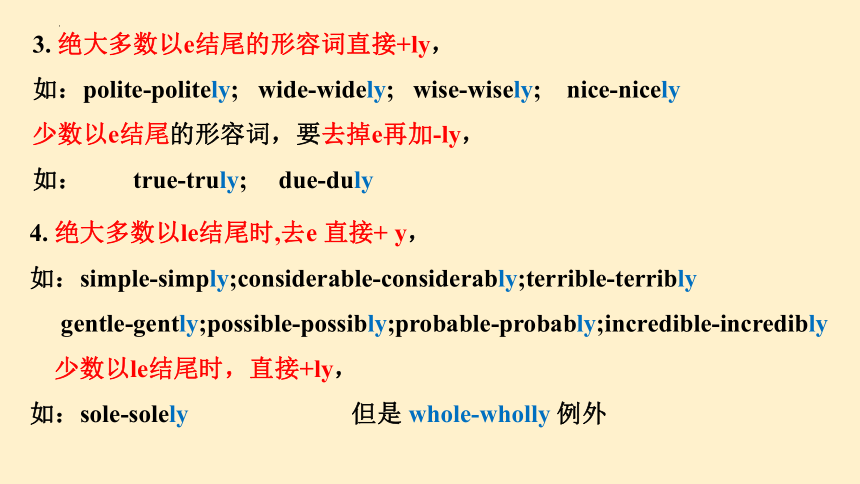
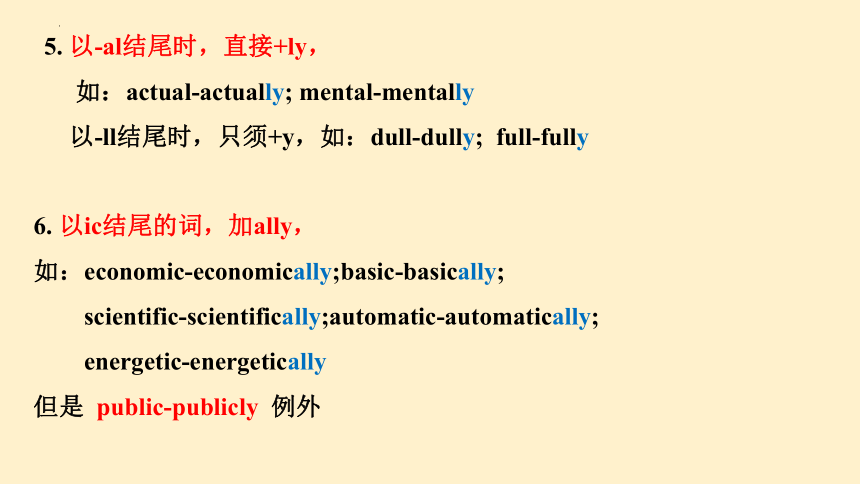
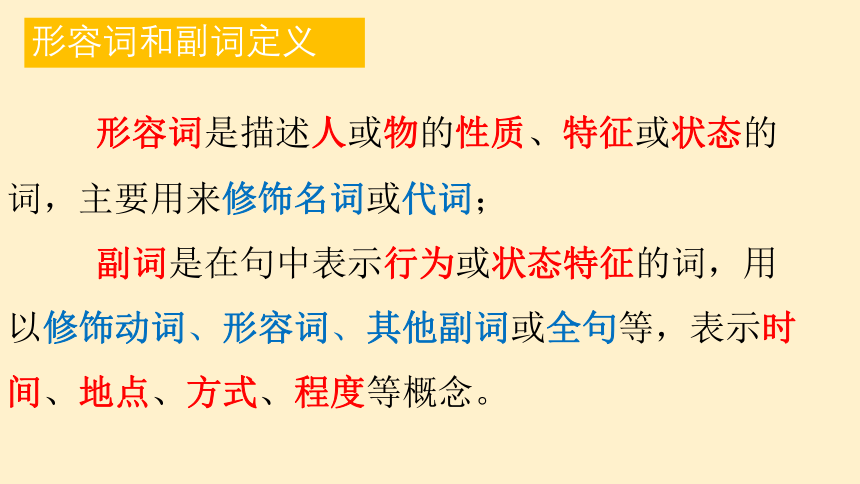

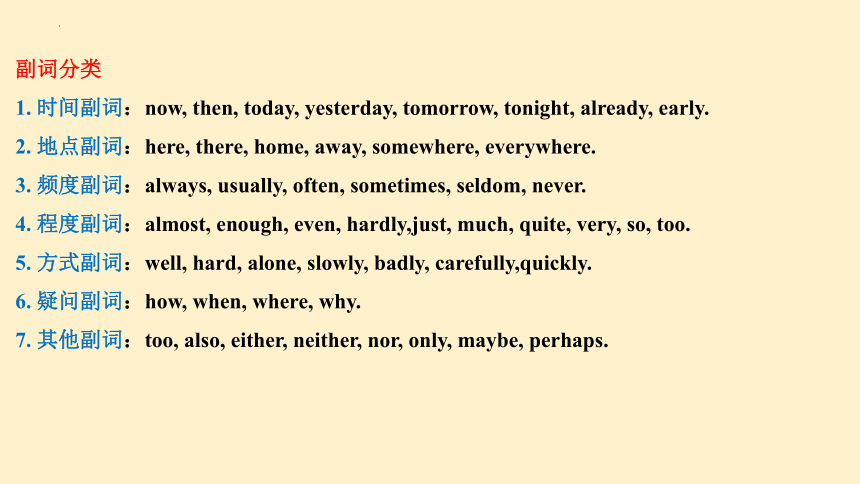
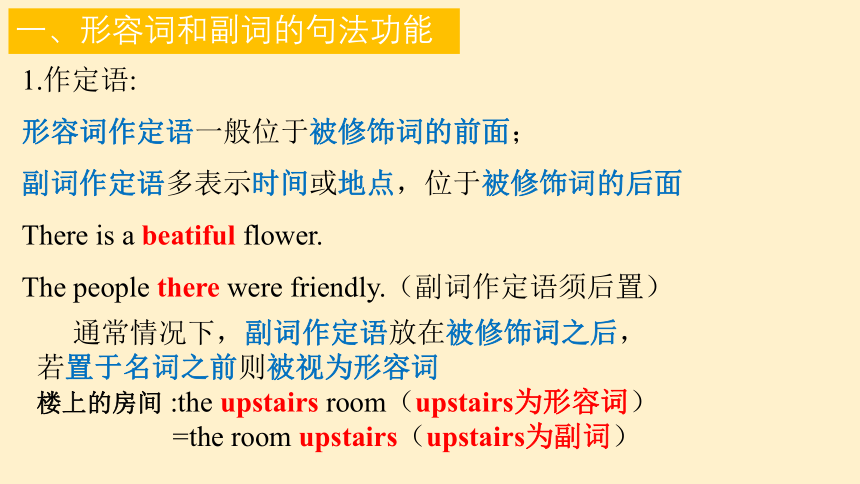
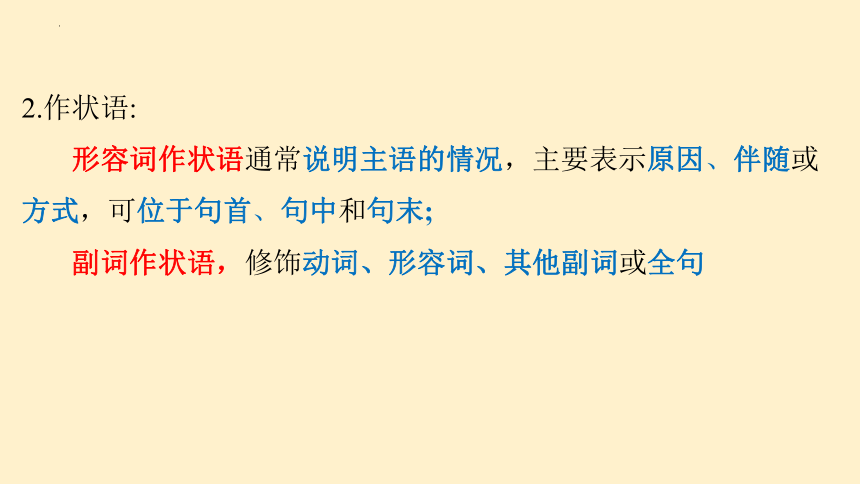
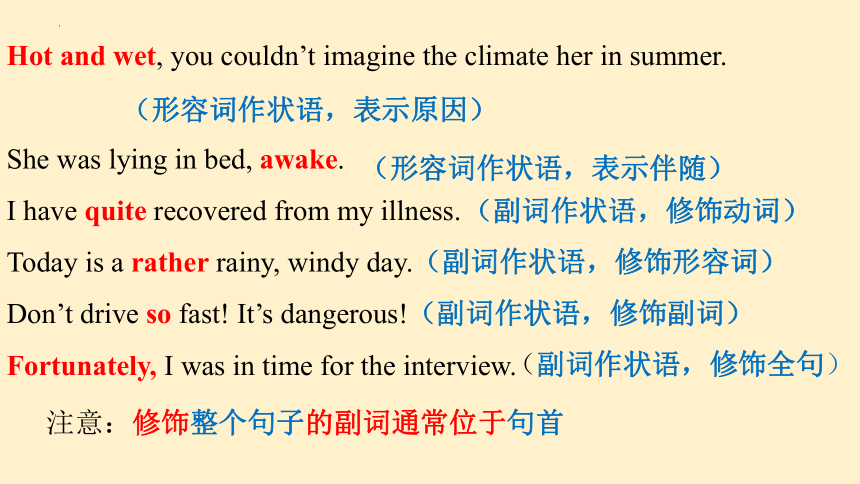
文档简介
(共47张PPT)
Grammar
形容词\副词
(Adjectives\ Adverbials)
Warm-up(猜猜下列的单词并说出词性)
1.recaluf
2.veern
3. inth
4. mesotisem
5. redayal
6. trgnos
careful adj.
never adv.
thin adj.
sometimes adv.
already adv.
strong adj.
形容词的变换
名词
形容词
名词后面+y
wind
windy
luck
lucky
名词后面+ern
north
northern
east
eastern
名词后面+n
Africa
African
Australia
Australian
名词后面+ful
care
careful
beauty
beautiful
名词后面+less
care
careless
meaning
meaningless
名词后面+en
wood
wooden
wool
woolen
1. 一般直接在词尾+ ly;
quick-quickly; sad-sadly
2. 以“辅音y, 读音为/i/”结尾,把 y 改为 i,再+ ly,
如:happy-happily; heavy-heavily;
angry-angrily; busy-busily
以“元音y, 读音为/ai/”,直接+ly,
如: dry-dryly; shy---shyly
形容词变副词的变换规则
3. 绝大多数以e结尾的形容词直接+ly,
如:polite-politely; wide-widely; wise-wisely; nice-nicely
少数以e结尾的形容词,要去掉e再加-ly,
如: true-truly; due-duly
4. 绝大多数以le结尾时,去e 直接+ y,
如:simple-simply;considerable-considerably;terrible-terribly
gentle-gently;possible-possibly;probable-probably;incredible-incredibly
少数以le结尾时,直接+ly,
如:sole-solely 但是 whole-wholly 例外
5. 以-al结尾时,直接+ly,
如:actual-actually; mental-mentally
以-ll结尾时,只须+y,如:dull-dully; full-fully
6. 以ic结尾的词,加ally,
如:economic-economically;basic-basically;
scientific-scientifically;automatic-automatically;
energetic-energetically
但是 public-publicly 例外
形容词和副词定义
形容词是描述人或物的性质、特征或状态的词,主要用来修饰名词或代词;
副词是在句中表示行为或状态特征的词,用以修饰动词、形容词、其他副词或全句等,表示时间、地点、方式、程度等概念。
形容词(adj.)、副词(adv.)
… …的
… …地
副词分类
1. 时间副词:now, then, today, yesterday, tomorrow, tonight, already, early.
2. 地点副词:here, there, home, away, somewhere, everywhere.
3. 频度副词:always, usually, often, sometimes, seldom, never.
4. 程度副词:almost, enough, even, hardly,just, much, quite, very, so, too.
5. 方式副词:well, hard, alone, slowly, badly, carefully,quickly.
6. 疑问副词:how, when, where, why.
7. 其他副词:too, also, either, neither, nor, only, maybe, perhaps.
一、形容词和副词的句法功能
1.作定语:
形容词作定语一般位于被修饰词的前面;
副词作定语多表示时间或地点,位于被修饰词的后面
There is a beatiful flower.
The people there were friendly.(副词作定语须后置)
通常情况下,副词作定语放在被修饰词之后,
若置于名词之前则被视为形容词
楼上的房间 :the upstairs room(upstairs为形容词)
=the room upstairs(upstairs为副词)
2.作状语:
形容词作状语通常说明主语的情况,主要表示原因、伴随或方式,可位于句首、句中和句末;
副词作状语,修饰动词、形容词、其他副词或全句
Hot and wet, you couldn’t imagine the climate her in summer.
She was lying in bed, awake.
I have quite recovered from my illness.
Today is a rather rainy, windy day.(副词作状语,修饰形容词)
Don’t drive so fast! It’s dangerous!(副词作状语,修饰副词)
Fortunately, I was in time for the interview.
(形容词作状语,表示原因)
(形容词作状语,表示伴随)
(副词作状语,修饰动词)
(副词作状语,修饰全句)
注意:修饰整个句子的副词通常位于句首
3.作表语:
形容词作表语,通常位于系动词be, feel, get, turn, become, prove, seem之后;
副词作表语,表示主语的方位、方向、动作和状态等;
1. But the one million people were asleep as usual that night.
2. Is the radio on or off
(形容词作表语,表示状态)
(副词作表语,表示状态)
4.作补语:
形容词和副词都可以作主语补足语和宾语补足语,说明主语和宾语所处的位置、状态、性质、特征等;
1. The principal thing in this world is to keep one’s soul clean.
2. Keep the fire on for a few minutes.
(形容词作宾语补足语)
(副词作宾语补足语)
5.形容词的名词用法:
1)“the+形容词”泛指一类人,作主语时谓语动词用复数;
the young年轻人 the wise聪明人 the brave勇敢的人
the rich富人 the poor穷人 the blind盲人
the living活着的人 the sick病人 the Chinese中国人
the English英国人
2)“the+形容词”表示抽象概念,作主语时谓语动词用单数;
the best最好的情况 the unknown未知的事
the impossible不可能的事 the right正确的事
二、形容词的位置
1) 形容词也可位于被修饰名词之后;
①表语形容词用作名词的定语时:
He is the only person alive after the fire.
The baby still asleep might be awake very soon.
②当形容词修饰复合不定代词或指示代词时:
“He will give something wonderful to the world,” he said.”
③两个意义相近或相反的形容词用and, or或but连接,作定语时须后置;
Power stations, large or small, have been set up all over the country.
All the people on this island, young or old, are fond of music.(意义相反)
④当“形容词+不定式”构成的短语作定语时;
A man so difficult to please must be hard to work with.
He enjoys the music pleasant to listen to.
2) 形容词作定语时的特殊情况:
①一些形容词即可前置也可后置,意义不变;
a nearby village = a village nearby 附近的一个村子
the following decades =the decades following 以后的几十年
the only possible solution = the only solution possible 唯一可行的解决办法
the available data = the data available 可用数据
②一些形容词既可前置也可后置,但意义不同;
the present situation 目前的形势 a responsible person 一个可信赖的人
the people present 在场的人 the person responsible 负责人
1) 修饰动词时:
①程度副词(almost, nearly, rather, fairly等)、频率副词(always, never, often,
seldom等)一般放在实义动词之前;be动词、助动词和情态动词之后;
In his blind haste he almost ran into the river.
On Saturday, he seldom stays in the house.
I reckon that he is rather too old to marry again.
You’ve always been my close friend.
三、副词的位置
(程度副词almost位于run前)
(频率副词seldom位于stay前)
(程度副词rather位于系动词后)
(频率副词always位于第一个助动词之后)
②时间副词和地点副词同时出现时,时间副词置后;
I have gone nowhere recently, for I have a dozen irons in the fire.
She sat quietly in the room for an hour.
③方式副词大多位于句尾,但当宾语过长时,副词可以提前,以使句子平衡。但well, baby, hard等只放在句尾;
We could see very clearly a strangely light ahead of us.
(宾语为a strange light ahead of us,因此clearly提前)
He speaks English well.(well只能放在句末)
2) 修饰名词时:
大部分副词修饰名词时,通常放在名词后面;
但也有小部分放在所修饰的名词之前;
①位于名词之后;
He bought a book on his way home.
Can you see the beautiful house there
②位于“不定冠词+名词”之前;
He room is rather a mess.
The news is quite a surprise.
3) 修饰形容词或其他副词时,副词通常放在所修饰词的前面,
但是副词enough要放在所修饰词的后面;
Thanksgiving is a very important festival in the United States.
One can never be careful enough.
注意:形容词enough放在名词前后均可
副词very可以修饰形容词,但不能修饰动词
I very like English.(×) I like English very much.(√)
1.原级的用法:
1)“as+形容词/副词原级+as+比较对象”表示双方在性质、程度、特征
等方面相等或相似;
It’s as strong as any other car running on the street.
拓展:有时“as…as…”结构并不用来表示两者之间的比较,
而是用来描述同一个人或事物的特性;
Take as many apples as you like.
We will help you as far as we can.
I’m happy as long as you are happy.
三、形容词和副词的比较级
2)“not + as /so+形容词/副词原级+as+比较对象”表示“……不如……”
Dad does not smoke so heavily as he used to.爸
3)“倍数+as+形容词/副词原级+as+比较对象”表示“……是……的几倍”
Tom is twice as old as Kate.
Tom runs twice as fast as Mike.
4)“not+比较级+than”意为“……不如……”
“no+比较级+than”意为“两者都不……”
Tom is not cleverer than John.
Tom is no cleverer than John.
汤姆不如约翰聪明
汤姆和约翰都不聪明
2.比较级的用法:
1)“形容词/副词比较级+than+比较对象”表示“……高于或低于……”
Time is precious, but truth is more precious than time.
2)“倍数+形容词/副词比较级+than+比较对象”表示“大/多……几倍”
At a rough estimate, Nigeria is twice larger than Great Britain.
注意:
a. 比较时,比较对象要一致;
The population of Canada is smaller than Africa.(×)
The population of Canada is smaller than that of Africa.(√)
b. 同类事物进行比较时,比较的对象不能相互包含;
China is larger than any other country in Asia.
(中国属于亚洲,用other排除)
c. than后面接代词一般用主格,但口语中也可用宾格;
3)“比较级+and+比较级”表示“越来越……”
During the Han Dynasty, Chinese people managed to travel further and further
along the Silk Road, introducing silk, china, tea, etc. to other countries.
4)“the+比较级,the+比较级”表示“越来越…”
I was getting more and more annoyed and of course, the more upset I got,
the less I was able to concentrate.
5)“the+形容词比较级+of’ the two+名词”表示“某人或某物是两者中较....的”
I’ll give you the bigger of the two steaks; I’m not very hungry.
6) more than结构的用法:
We have more than 2,000 books now.
His report is more than a survey.
You were more lucky than bright.
I was more than a little angry when I saw how they’d ruined it.
More often than not people don’t realize what their rights are.
=over,意为“超出”
=very,意为“很,非常”
意为“不仅”
more …than…意为“与其……不如……”
more often than not意为“时常”
7) 比较级使用中需注意的几个问题:
a.比较级可用much, even, still, far, a lot, a little, rather等修饰;
My sister is a little taller than me.
Their house is much larger than ours.
b.比较级前一般不加冠词,但在下列情况下,比较级前要加the;
①表示两者选择,比较级后有被修饰的名词时:
Who is the younger one, Lily or Lucy
②有“of the two…”结构表示范围时:
Of the two jobs, he chose the harder.
③在“the more…,the more…”结构中:
The higher the ground is, the thinner air becomes.
构成方法 原级 比较级 最高级
单音节词和部分双音节词 一般在词尾加-er或-est tall short slow taller shorter slower tallest
shortest
slowest
以字母e结尾的词,在词尾加 -r或-st fine late finer later finest
latest
重读闭音节词词尾只有一个辅音字母时,先双写该辅音字母,再加-er或-est big thin fat bigger thinner fatter biggest
thinnest
fattest
以“辅音字母 + y”结尾的双音节词,先把“y”改为“i”,再加-er或-est easy funny early easier funnier earlier easiest
funniest
earliest
多音节词和部分双音节词 在词前加more或most beautiful interesting comfortably more beautiful more interesting more comfortably most beautiful
most interesting
most comfortably
原级 比较级 最高级
good/well better best
bad/badly worse worst
many/much more most
little less least
far farther farthest
further furthest
3.最高级的用法:
1)“the+最高级(+比较范围)”表示“……是(……中)最……的”
I like turkey breast the best. I put so much food in my mouth sometimes
that I was hard to swallow.
2)“主语+ be + one of the +最高级+复数名词+比较范围”
表示“……是……中最……之一”
Beijing is one of the largest cities in China.
3)“特殊疑问词+…+the+最高级”,甲,乙,or 丙”用于三者之间的比较
Which country is the largest, China, Brazil or Canada
4) 表示“最高程度”的形容词,如excellent, extreme, perfect等,
没有比较级和最高级
The weather is perfect for a picnic.\ Brooks is an excellent composer.
(1)哪个国家更大,加拿大还是澳大利亚
(2)她比另一个女孩高。
Which is larger, Canada or Australia
=Which is the larger country, Canada or Australia
She is taller than other girl.
=She is the taller of the two girls.
拓展:最高级的其他表示方法:
1)“否定词+比较级”结构表示最高级含义
Nothing is easily than this.
=Nothing is the easiest thing except this.
2) 比较级+than any other+单数可数名词
Bamboo probably has many more uses than any other plant in the world.
(more…than any other plants=more…than all the other plants)
3) never…such+名词
I have never seen such a beautiful scene.
形容词最高级前通常要加定冠词the,而以下几种情况则不需要:
① 形容词最高级作表语,而比较范围又不明确时;
They are happiest on Saturdays.
拓展:当very在最高级前作修饰语时,其前面必须加一个限定词
Mary is the very thinnest.
② 作状语的副词最高级前可以不用the;
Of all the boys he came (the) earliest.
③ 形容词最高级前有序数词、物主代词、指示代词或名词所有格等
限定词修饰时,最高级前不用the;
Hainan is China’s second largest island.
④如果两个形容词最高级并列修饰同一个名词时,
第二个形容词最高级前不加the;
He is the youngest and tallest boy in his class.。
⑤如果形容词最高级用来加强语气,作“很、十分,非常”之意讲时,
前面不加the;
That book is most interesting.那本书非常有趣。
⑥作宾语补足语的形容词最高级前不加the;
I found it most difficult to go to sleep.
⑦在一些固定用法中,最高级前通常省略the;
With best wishes for you.
形容词和副词巩固练习
1. -- I put my purse on the table just now, have you seen it
——No. I haven’t. You should never put __________ on the desk anyway.
anything important
B. important anything
C. something important
D. important something
2. ——How was your final exam
——The English and Maths papers weren’t __________ for me. I hope I haven’t failed.
A. easy enough B. difficult enough
C. enough easy D. enough difficult
C
A
3.-- Could you tell me something about the museum
—— Yes, It was built in 1979, 230 __________ and 220 ____________.
long meters; wide meters
B. meters long; wide meters
C. long meters; meters wide
D. meters long; meters wide
4. ——What’s your present for Kangkang’s birthday
-- He likes painting, so I’m going to buy him a __________ paintings.
fine little brown French B. little brown fine French
C. little fine brown French D. French little brown fine
D
A
5. The rich __________ necessarily happy.
A. isn’t B. aren’t C. wasn’t D. weren’t
6. Keeping the balance of nature is so ________.
A. easier B. more difficult C. important D. interested
7. The film is not as ________ as you told me.
A. interested B. more interested C. more interesting D. interesting
8. This building is ________ that one over there.
A. as tall as twice B as twice as tall
C. so tall as twice D. twice as tall as
9. We live ________ now because we have changed the way we live.
A. long B. longer C. the longest D. short
B
C
D
D
B
10. Art is much ________ than life, but what a poor life without it!
A. less important B. more important
C. the most important D. important
11. -- Which shirt is ________, the blue one or the pink one
-- Oh, they are both nice, so it’s hard to choose.
A. nice B. nicer C. the nicest D. good
12. The harder you work, the ________ progress you will make.
A. great B. greater C. greatest D. little
13. If you keep playing sports every day you are getting ________.
A. good and good B. better and better
C. best and best D. better and best
A
B
B
B
17. These days, the Internet is becoming __________ useful as a search tool.
A. more and more B. most and most
C. much and more D. much and much
18. Tom is __________ experienced among the doctors here.
A. less B. least C. the less D. the least
19. Which is __________, the computer, the Internet or the robot
A. useful B. more useful C. the more useful D. the most useful
20. Beihai is one of __________ beautiful parks in Beijing.
A. the B. the more C. the most D. the less
A
D
D
C
14. ——Which is Tom
-- He is ________ of the two boys.
A. tall B. taller C. the taller D. the tallest
15. We should go on learning English although it is getting a little ________.
A. easy B. easier C. difficult D. more difficult
16. ——Mum, could you buy me a dress like this
——Of course. We can buy ________ one than this, but __________ it.
A. a better; better than B. a popular; as good as
C. a more popular; not as good as D. a cheaper; as good as
C
D
D
用所给词的适当形式填空
1. Please speak ________ (slow) so that we can make full notes.
2. They all come early, but she come ________(early) of all.
3. He played the piano ____________ (success) than we has thought.
4. Whoever is ________(quick) is going to have the better chance.
5. This radio is even _____________ (expensive) than that one.
more slowly
the earliest
more successfully
quickly
more expensive
6. This trip to China has ________(real) inspired me to relearn my Mandarin.
7. John’s handwriting is the ________(bad) of the three.
8. The most used letter in the English alphabet is "E", and "Q" is the ________(little) used!
9. Those who eat most are not always ________(fat); those who read most,
not always wisest.
10. The mother is ________(worry) about her son’s safety.
really
worst
least
fattest
worried
11. I’m going on a diet for I want to become ________ (thin).
12. In my grandfather’s time, computers were far ________ (popular) than they are today.
13. So ________ (excite) was the game that I forgot all about the coming finals.
14. Tom is ________ (tall) of all his brothers.
15. This is our ________(cheap) pen in our shop.
thinner
less popular
exciting
the tallest
cheapest
Thank you
Grammar
形容词\副词
(Adjectives\ Adverbials)
Warm-up(猜猜下列的单词并说出词性)
1.recaluf
2.veern
3. inth
4. mesotisem
5. redayal
6. trgnos
careful adj.
never adv.
thin adj.
sometimes adv.
already adv.
strong adj.
形容词的变换
名词
形容词
名词后面+y
wind
windy
luck
lucky
名词后面+ern
north
northern
east
eastern
名词后面+n
Africa
African
Australia
Australian
名词后面+ful
care
careful
beauty
beautiful
名词后面+less
care
careless
meaning
meaningless
名词后面+en
wood
wooden
wool
woolen
1. 一般直接在词尾+ ly;
quick-quickly; sad-sadly
2. 以“辅音y, 读音为/i/”结尾,把 y 改为 i,再+ ly,
如:happy-happily; heavy-heavily;
angry-angrily; busy-busily
以“元音y, 读音为/ai/”,直接+ly,
如: dry-dryly; shy---shyly
形容词变副词的变换规则
3. 绝大多数以e结尾的形容词直接+ly,
如:polite-politely; wide-widely; wise-wisely; nice-nicely
少数以e结尾的形容词,要去掉e再加-ly,
如: true-truly; due-duly
4. 绝大多数以le结尾时,去e 直接+ y,
如:simple-simply;considerable-considerably;terrible-terribly
gentle-gently;possible-possibly;probable-probably;incredible-incredibly
少数以le结尾时,直接+ly,
如:sole-solely 但是 whole-wholly 例外
5. 以-al结尾时,直接+ly,
如:actual-actually; mental-mentally
以-ll结尾时,只须+y,如:dull-dully; full-fully
6. 以ic结尾的词,加ally,
如:economic-economically;basic-basically;
scientific-scientifically;automatic-automatically;
energetic-energetically
但是 public-publicly 例外
形容词和副词定义
形容词是描述人或物的性质、特征或状态的词,主要用来修饰名词或代词;
副词是在句中表示行为或状态特征的词,用以修饰动词、形容词、其他副词或全句等,表示时间、地点、方式、程度等概念。
形容词(adj.)、副词(adv.)
… …的
… …地
副词分类
1. 时间副词:now, then, today, yesterday, tomorrow, tonight, already, early.
2. 地点副词:here, there, home, away, somewhere, everywhere.
3. 频度副词:always, usually, often, sometimes, seldom, never.
4. 程度副词:almost, enough, even, hardly,just, much, quite, very, so, too.
5. 方式副词:well, hard, alone, slowly, badly, carefully,quickly.
6. 疑问副词:how, when, where, why.
7. 其他副词:too, also, either, neither, nor, only, maybe, perhaps.
一、形容词和副词的句法功能
1.作定语:
形容词作定语一般位于被修饰词的前面;
副词作定语多表示时间或地点,位于被修饰词的后面
There is a beatiful flower.
The people there were friendly.(副词作定语须后置)
通常情况下,副词作定语放在被修饰词之后,
若置于名词之前则被视为形容词
楼上的房间 :the upstairs room(upstairs为形容词)
=the room upstairs(upstairs为副词)
2.作状语:
形容词作状语通常说明主语的情况,主要表示原因、伴随或方式,可位于句首、句中和句末;
副词作状语,修饰动词、形容词、其他副词或全句
Hot and wet, you couldn’t imagine the climate her in summer.
She was lying in bed, awake.
I have quite recovered from my illness.
Today is a rather rainy, windy day.(副词作状语,修饰形容词)
Don’t drive so fast! It’s dangerous!(副词作状语,修饰副词)
Fortunately, I was in time for the interview.
(形容词作状语,表示原因)
(形容词作状语,表示伴随)
(副词作状语,修饰动词)
(副词作状语,修饰全句)
注意:修饰整个句子的副词通常位于句首
3.作表语:
形容词作表语,通常位于系动词be, feel, get, turn, become, prove, seem之后;
副词作表语,表示主语的方位、方向、动作和状态等;
1. But the one million people were asleep as usual that night.
2. Is the radio on or off
(形容词作表语,表示状态)
(副词作表语,表示状态)
4.作补语:
形容词和副词都可以作主语补足语和宾语补足语,说明主语和宾语所处的位置、状态、性质、特征等;
1. The principal thing in this world is to keep one’s soul clean.
2. Keep the fire on for a few minutes.
(形容词作宾语补足语)
(副词作宾语补足语)
5.形容词的名词用法:
1)“the+形容词”泛指一类人,作主语时谓语动词用复数;
the young年轻人 the wise聪明人 the brave勇敢的人
the rich富人 the poor穷人 the blind盲人
the living活着的人 the sick病人 the Chinese中国人
the English英国人
2)“the+形容词”表示抽象概念,作主语时谓语动词用单数;
the best最好的情况 the unknown未知的事
the impossible不可能的事 the right正确的事
二、形容词的位置
1) 形容词也可位于被修饰名词之后;
①表语形容词用作名词的定语时:
He is the only person alive after the fire.
The baby still asleep might be awake very soon.
②当形容词修饰复合不定代词或指示代词时:
“He will give something wonderful to the world,” he said.”
③两个意义相近或相反的形容词用and, or或but连接,作定语时须后置;
Power stations, large or small, have been set up all over the country.
All the people on this island, young or old, are fond of music.(意义相反)
④当“形容词+不定式”构成的短语作定语时;
A man so difficult to please must be hard to work with.
He enjoys the music pleasant to listen to.
2) 形容词作定语时的特殊情况:
①一些形容词即可前置也可后置,意义不变;
a nearby village = a village nearby 附近的一个村子
the following decades =the decades following 以后的几十年
the only possible solution = the only solution possible 唯一可行的解决办法
the available data = the data available 可用数据
②一些形容词既可前置也可后置,但意义不同;
the present situation 目前的形势 a responsible person 一个可信赖的人
the people present 在场的人 the person responsible 负责人
1) 修饰动词时:
①程度副词(almost, nearly, rather, fairly等)、频率副词(always, never, often,
seldom等)一般放在实义动词之前;be动词、助动词和情态动词之后;
In his blind haste he almost ran into the river.
On Saturday, he seldom stays in the house.
I reckon that he is rather too old to marry again.
You’ve always been my close friend.
三、副词的位置
(程度副词almost位于run前)
(频率副词seldom位于stay前)
(程度副词rather位于系动词后)
(频率副词always位于第一个助动词之后)
②时间副词和地点副词同时出现时,时间副词置后;
I have gone nowhere recently, for I have a dozen irons in the fire.
She sat quietly in the room for an hour.
③方式副词大多位于句尾,但当宾语过长时,副词可以提前,以使句子平衡。但well, baby, hard等只放在句尾;
We could see very clearly a strangely light ahead of us.
(宾语为a strange light ahead of us,因此clearly提前)
He speaks English well.(well只能放在句末)
2) 修饰名词时:
大部分副词修饰名词时,通常放在名词后面;
但也有小部分放在所修饰的名词之前;
①位于名词之后;
He bought a book on his way home.
Can you see the beautiful house there
②位于“不定冠词+名词”之前;
He room is rather a mess.
The news is quite a surprise.
3) 修饰形容词或其他副词时,副词通常放在所修饰词的前面,
但是副词enough要放在所修饰词的后面;
Thanksgiving is a very important festival in the United States.
One can never be careful enough.
注意:形容词enough放在名词前后均可
副词very可以修饰形容词,但不能修饰动词
I very like English.(×) I like English very much.(√)
1.原级的用法:
1)“as+形容词/副词原级+as+比较对象”表示双方在性质、程度、特征
等方面相等或相似;
It’s as strong as any other car running on the street.
拓展:有时“as…as…”结构并不用来表示两者之间的比较,
而是用来描述同一个人或事物的特性;
Take as many apples as you like.
We will help you as far as we can.
I’m happy as long as you are happy.
三、形容词和副词的比较级
2)“not + as /so+形容词/副词原级+as+比较对象”表示“……不如……”
Dad does not smoke so heavily as he used to.爸
3)“倍数+as+形容词/副词原级+as+比较对象”表示“……是……的几倍”
Tom is twice as old as Kate.
Tom runs twice as fast as Mike.
4)“not+比较级+than”意为“……不如……”
“no+比较级+than”意为“两者都不……”
Tom is not cleverer than John.
Tom is no cleverer than John.
汤姆不如约翰聪明
汤姆和约翰都不聪明
2.比较级的用法:
1)“形容词/副词比较级+than+比较对象”表示“……高于或低于……”
Time is precious, but truth is more precious than time.
2)“倍数+形容词/副词比较级+than+比较对象”表示“大/多……几倍”
At a rough estimate, Nigeria is twice larger than Great Britain.
注意:
a. 比较时,比较对象要一致;
The population of Canada is smaller than Africa.(×)
The population of Canada is smaller than that of Africa.(√)
b. 同类事物进行比较时,比较的对象不能相互包含;
China is larger than any other country in Asia.
(中国属于亚洲,用other排除)
c. than后面接代词一般用主格,但口语中也可用宾格;
3)“比较级+and+比较级”表示“越来越……”
During the Han Dynasty, Chinese people managed to travel further and further
along the Silk Road, introducing silk, china, tea, etc. to other countries.
4)“the+比较级,the+比较级”表示“越来越…”
I was getting more and more annoyed and of course, the more upset I got,
the less I was able to concentrate.
5)“the+形容词比较级+of’ the two+名词”表示“某人或某物是两者中较....的”
I’ll give you the bigger of the two steaks; I’m not very hungry.
6) more than结构的用法:
We have more than 2,000 books now.
His report is more than a survey.
You were more lucky than bright.
I was more than a little angry when I saw how they’d ruined it.
More often than not people don’t realize what their rights are.
=over,意为“超出”
=very,意为“很,非常”
意为“不仅”
more …than…意为“与其……不如……”
more often than not意为“时常”
7) 比较级使用中需注意的几个问题:
a.比较级可用much, even, still, far, a lot, a little, rather等修饰;
My sister is a little taller than me.
Their house is much larger than ours.
b.比较级前一般不加冠词,但在下列情况下,比较级前要加the;
①表示两者选择,比较级后有被修饰的名词时:
Who is the younger one, Lily or Lucy
②有“of the two…”结构表示范围时:
Of the two jobs, he chose the harder.
③在“the more…,the more…”结构中:
The higher the ground is, the thinner air becomes.
构成方法 原级 比较级 最高级
单音节词和部分双音节词 一般在词尾加-er或-est tall short slow taller shorter slower tallest
shortest
slowest
以字母e结尾的词,在词尾加 -r或-st fine late finer later finest
latest
重读闭音节词词尾只有一个辅音字母时,先双写该辅音字母,再加-er或-est big thin fat bigger thinner fatter biggest
thinnest
fattest
以“辅音字母 + y”结尾的双音节词,先把“y”改为“i”,再加-er或-est easy funny early easier funnier earlier easiest
funniest
earliest
多音节词和部分双音节词 在词前加more或most beautiful interesting comfortably more beautiful more interesting more comfortably most beautiful
most interesting
most comfortably
原级 比较级 最高级
good/well better best
bad/badly worse worst
many/much more most
little less least
far farther farthest
further furthest
3.最高级的用法:
1)“the+最高级(+比较范围)”表示“……是(……中)最……的”
I like turkey breast the best. I put so much food in my mouth sometimes
that I was hard to swallow.
2)“主语+ be + one of the +最高级+复数名词+比较范围”
表示“……是……中最……之一”
Beijing is one of the largest cities in China.
3)“特殊疑问词+…+the+最高级”,甲,乙,or 丙”用于三者之间的比较
Which country is the largest, China, Brazil or Canada
4) 表示“最高程度”的形容词,如excellent, extreme, perfect等,
没有比较级和最高级
The weather is perfect for a picnic.\ Brooks is an excellent composer.
(1)哪个国家更大,加拿大还是澳大利亚
(2)她比另一个女孩高。
Which is larger, Canada or Australia
=Which is the larger country, Canada or Australia
She is taller than other girl.
=She is the taller of the two girls.
拓展:最高级的其他表示方法:
1)“否定词+比较级”结构表示最高级含义
Nothing is easily than this.
=Nothing is the easiest thing except this.
2) 比较级+than any other+单数可数名词
Bamboo probably has many more uses than any other plant in the world.
(more…than any other plants=more…than all the other plants)
3) never…such+名词
I have never seen such a beautiful scene.
形容词最高级前通常要加定冠词the,而以下几种情况则不需要:
① 形容词最高级作表语,而比较范围又不明确时;
They are happiest on Saturdays.
拓展:当very在最高级前作修饰语时,其前面必须加一个限定词
Mary is the very thinnest.
② 作状语的副词最高级前可以不用the;
Of all the boys he came (the) earliest.
③ 形容词最高级前有序数词、物主代词、指示代词或名词所有格等
限定词修饰时,最高级前不用the;
Hainan is China’s second largest island.
④如果两个形容词最高级并列修饰同一个名词时,
第二个形容词最高级前不加the;
He is the youngest and tallest boy in his class.。
⑤如果形容词最高级用来加强语气,作“很、十分,非常”之意讲时,
前面不加the;
That book is most interesting.那本书非常有趣。
⑥作宾语补足语的形容词最高级前不加the;
I found it most difficult to go to sleep.
⑦在一些固定用法中,最高级前通常省略the;
With best wishes for you.
形容词和副词巩固练习
1. -- I put my purse on the table just now, have you seen it
——No. I haven’t. You should never put __________ on the desk anyway.
anything important
B. important anything
C. something important
D. important something
2. ——How was your final exam
——The English and Maths papers weren’t __________ for me. I hope I haven’t failed.
A. easy enough B. difficult enough
C. enough easy D. enough difficult
C
A
3.-- Could you tell me something about the museum
—— Yes, It was built in 1979, 230 __________ and 220 ____________.
long meters; wide meters
B. meters long; wide meters
C. long meters; meters wide
D. meters long; meters wide
4. ——What’s your present for Kangkang’s birthday
-- He likes painting, so I’m going to buy him a __________ paintings.
fine little brown French B. little brown fine French
C. little fine brown French D. French little brown fine
D
A
5. The rich __________ necessarily happy.
A. isn’t B. aren’t C. wasn’t D. weren’t
6. Keeping the balance of nature is so ________.
A. easier B. more difficult C. important D. interested
7. The film is not as ________ as you told me.
A. interested B. more interested C. more interesting D. interesting
8. This building is ________ that one over there.
A. as tall as twice B as twice as tall
C. so tall as twice D. twice as tall as
9. We live ________ now because we have changed the way we live.
A. long B. longer C. the longest D. short
B
C
D
D
B
10. Art is much ________ than life, but what a poor life without it!
A. less important B. more important
C. the most important D. important
11. -- Which shirt is ________, the blue one or the pink one
-- Oh, they are both nice, so it’s hard to choose.
A. nice B. nicer C. the nicest D. good
12. The harder you work, the ________ progress you will make.
A. great B. greater C. greatest D. little
13. If you keep playing sports every day you are getting ________.
A. good and good B. better and better
C. best and best D. better and best
A
B
B
B
17. These days, the Internet is becoming __________ useful as a search tool.
A. more and more B. most and most
C. much and more D. much and much
18. Tom is __________ experienced among the doctors here.
A. less B. least C. the less D. the least
19. Which is __________, the computer, the Internet or the robot
A. useful B. more useful C. the more useful D. the most useful
20. Beihai is one of __________ beautiful parks in Beijing.
A. the B. the more C. the most D. the less
A
D
D
C
14. ——Which is Tom
-- He is ________ of the two boys.
A. tall B. taller C. the taller D. the tallest
15. We should go on learning English although it is getting a little ________.
A. easy B. easier C. difficult D. more difficult
16. ——Mum, could you buy me a dress like this
——Of course. We can buy ________ one than this, but __________ it.
A. a better; better than B. a popular; as good as
C. a more popular; not as good as D. a cheaper; as good as
C
D
D
用所给词的适当形式填空
1. Please speak ________ (slow) so that we can make full notes.
2. They all come early, but she come ________(early) of all.
3. He played the piano ____________ (success) than we has thought.
4. Whoever is ________(quick) is going to have the better chance.
5. This radio is even _____________ (expensive) than that one.
more slowly
the earliest
more successfully
quickly
more expensive
6. This trip to China has ________(real) inspired me to relearn my Mandarin.
7. John’s handwriting is the ________(bad) of the three.
8. The most used letter in the English alphabet is "E", and "Q" is the ________(little) used!
9. Those who eat most are not always ________(fat); those who read most,
not always wisest.
10. The mother is ________(worry) about her son’s safety.
really
worst
least
fattest
worried
11. I’m going on a diet for I want to become ________ (thin).
12. In my grandfather’s time, computers were far ________ (popular) than they are today.
13. So ________ (excite) was the game that I forgot all about the coming finals.
14. Tom is ________ (tall) of all his brothers.
15. This is our ________(cheap) pen in our shop.
thinner
less popular
exciting
the tallest
cheapest
Thank you
